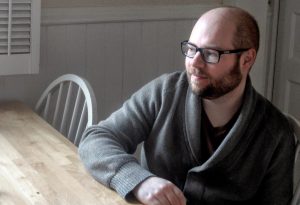Lost and Found Author Spotlight – Angeline Schellenberg
April 9, 2019

Anthony Mark Photography
Angeline Schellenberg is the author of Tell Them It Was Mozart (Brick Books, 2016), a collection about raising children on the autism spectrum. It received the Lansdowne Prize for Poetry, the Eileen McTavish Sykes Award for Best First Book, and the John Hirsch Award for Most Promising Manitoba Writer, and was shortlisted for a ReLit Award. She follows up on Roads of Stone (Alfred Gustav Press, 2015) with two new chapbooks in 2019: Irises (Dancing Girl Press) and Dented Tubas (Kalamalka Press). Angeline is a copy editor living in Treaty 1 Territory (Winnipeg) with her husband, their two teenagers, and a German shepherd-corgi.
Her poem “Sunset on Deep Bay” can be read here.
Canadian Literature issue 236, Lost and Found, is available to order through our online store.
Lost and Found Author Spotlight – Heather Macfarlane
April 2, 2019
 Heather Macfarlane is Assistant Adjunct Professor at Queen’s University in Kingston. Her work focuses on Canadian and Indigenous literatures, and she has published on road narratives, Indigenous language in theatre, comparative anglo- and francophone literature, and Canadian and Indigenous nationhood. Her book on the road narrative is forthcoming from University of Ottawa Press.
Heather Macfarlane is Assistant Adjunct Professor at Queen’s University in Kingston. Her work focuses on Canadian and Indigenous literatures, and she has published on road narratives, Indigenous language in theatre, comparative anglo- and francophone literature, and Canadian and Indigenous nationhood. Her book on the road narrative is forthcoming from University of Ottawa Press.
Article Abstract
The release in 2015 of the final report of the Truth and Reconciliation Commission examining Canada’s Residential School system coincided with the lead-up to the 50th anniversary of the tragic death of Chanie Wenjack, who died trying to escape residential school in 1966. Migmaw singer Willie Dunn’s 1971 song “Charlie Wenjack” and Stó:lōwriter Lee Maracle’s 1976/1990 short story “Charlie” ensured that the story remained in circulation in Indigenous communities, and after the release of the final report of the TRC, Canadian musician Gord Downie and author Joseph Boyden re-invigorated the story and introduced it to Canadians with their own versions of the tragedy. While Dunn and Maracle use strategies of resistance common to the protest movements of the ‘60s and ‘70s to tell Wenjack’s story, Downie and Boyden use strategies of affect to reach their audiences. All four artists are clearly working for change, but what the tellings of the stories ultimately serve to illustrate are two conflicting approaches to reconciliation—the first promoting Indigenous subjectivity, and the second Canadian nationhood.
Canadian Literature issue 236, Lost and Found, is available to order through our online store.
Lost and Found Author Spotlight – Franco Cortese
March 26, 2019
 Franco Cortese is an experimental poet living in Thorold, Ontario. His work has appeared or is forthcoming in Canadian Literature, The Capilano Review, filling Station, ditch, and others. His recent chapbooks include aeiou (No Press, 2018), uoiea (above/ground press, 2019), teksker (Simulacrum Press, 2019), The Thorny Inane (Grey Borders Books, forthcoming), and Ash Into Brick (Grey Borders Books, forthcoming). He also has leaflets, booklets, nanopamphlets, and broadsheets published or forthcoming through The Blasted Tree, Penteract Press, and Spacecraft Press. His work has been published both within Canada and internationally, most recently in the anthology Concrete and Constraint (Penteract Press 2018).
Franco Cortese is an experimental poet living in Thorold, Ontario. His work has appeared or is forthcoming in Canadian Literature, The Capilano Review, filling Station, ditch, and others. His recent chapbooks include aeiou (No Press, 2018), uoiea (above/ground press, 2019), teksker (Simulacrum Press, 2019), The Thorny Inane (Grey Borders Books, forthcoming), and Ash Into Brick (Grey Borders Books, forthcoming). He also has leaflets, booklets, nanopamphlets, and broadsheets published or forthcoming through The Blasted Tree, Penteract Press, and Spacecraft Press. His work has been published both within Canada and internationally, most recently in the anthology Concrete and Constraint (Penteract Press 2018).
His poem “Il Aqua” can be read here.
Canadian Literature issue 236, Lost and Found, is available to order through our online store.
Lost and Found Author Spotlight – Andre Furlani
March 19, 2019
 Andre Furlani is Professor and Chair of the Department of English, Concordia University, and the author of Beckett after Wittgenstein and Guy Davenport: Postmodern and After. Recent publications on modern and contemporary comparative literature have appeared in PMLA, Modernism/modernity, Philosophy and Literature, and Bréac, as well as in Speaking Memory: How Translation Shapes City Life and The Oxford History of the Classical Reception in English Literature.
Andre Furlani is Professor and Chair of the Department of English, Concordia University, and the author of Beckett after Wittgenstein and Guy Davenport: Postmodern and After. Recent publications on modern and contemporary comparative literature have appeared in PMLA, Modernism/modernity, Philosophy and Literature, and Bréac, as well as in Speaking Memory: How Translation Shapes City Life and The Oxford History of the Classical Reception in English Literature.
Article Abstract
Because it is a particularly dense, varied, and vigorously contested social imaginary, Montreal gives rise to uneven geographies and spatial instabilities that its pedestrian writers nimbly tread and transform. Montreal’s contemporary literary flâneurs and flâneuses are not blasé loiterers but gregarious foragers on the prowl for the composite character of a polyglot city that defies subordination to a unifying social script. Diversely situated in terms of class, race, ethnicity, gender, and language, the French and English novels of Leonard Cohen, Rawi Hage, Gail Scott, André Carpentier, Peter Dubé, and Hugh Hood trace altered paths of civic participation, where personal freedoms and group obligations intersect and, just as freely, disentangle and separate. Transient assembly, rather than institutional partisan affiliation, becomes a pedestrian mode of political agility. While they are anonymous, unsponsored and free subjects on the bummel from the encroachments of social identity and State categories, equally the strollers of Beautiful Losers, Cockroach, Heroine, Ruelles, The City’s Gates, and Around the Mountain belong to an informal civilian sentinel that, relying on the provision of public works, patrols the city’s liberties and modifies its contours. These peripatetic texts reveal that the public third spaces of casual encounter are not confined strictly to determinate sites but are as fluid and situational as the languages employed there. They not only “note while loitering” (the meaning of Carpentier’s portmanteau verb flânoter) but also help modify Montreal in a stealthy guerrilla urbanism that is remaking the contemporary North American city. And in the process they overstep narrative conventions.
Canadian Literature issue 236, Lost and Found, is available to order through our online store.
Lost and Found Author Spotlight – A. F. Moritz
March 12, 2019
 A. F. Moritz’s most recent books are The Sparrow: Selected Poems (2018) and two from 2015, Sequence: a Poem, and the republication by Princeton University Press of his 1986 book, The Tradition. His poetry has received the Griffin Poetry Prize, the Guggenheim Fellowship, the Award in Literature of the American Academy of Arts and Letters, and has appeared in many editions of the annual anthologies The Best Canadian Poetry and The Best American Poetry.
A. F. Moritz’s most recent books are The Sparrow: Selected Poems (2018) and two from 2015, Sequence: a Poem, and the republication by Princeton University Press of his 1986 book, The Tradition. His poetry has received the Griffin Poetry Prize, the Guggenheim Fellowship, the Award in Literature of the American Academy of Arts and Letters, and has appeared in many editions of the annual anthologies The Best Canadian Poetry and The Best American Poetry.
His poem “Oh Sunflower” can be read here.
Canadian Literature issue 236, Lost and Found, is available to order through our online store.
Lost and Found Author Spotlight – Ryan Fitzpatrick
March 5, 2019
 Ryan Fitzpatrick recently completed a PhD at Simon Fraser University and is currently a SSHRC Postdoctoral Fellow at the University of Toronto Scarborough. He is the author of two books of poetry: Fortified Castles (Talonbooks, 2014) and Fake Math (Snare, 2007). With Jonathan Ball, he edited Why Poetry Sucks: An Anthology of Humorous Experimental Canadian Poetry (Insomniac, 2014). With Deanna Fong and Janey Dodd, he worked on the Fred Wah Digital Archive.
Ryan Fitzpatrick recently completed a PhD at Simon Fraser University and is currently a SSHRC Postdoctoral Fellow at the University of Toronto Scarborough. He is the author of two books of poetry: Fortified Castles (Talonbooks, 2014) and Fake Math (Snare, 2007). With Jonathan Ball, he edited Why Poetry Sucks: An Anthology of Humorous Experimental Canadian Poetry (Insomniac, 2014). With Deanna Fong and Janey Dodd, he worked on the Fred Wah Digital Archive.
Article Abstract
In this article, I read the poetry of Lisa Robertson and Mercedes Eng, both of whom stage, confront, and critique the capitalist and colonial processes that stabilize and destabilize the material relations that compose Vancouver in the twenty-first century. As processes, stabilization and destabilization involve both the ways a space is subject to change and the ways that individual actors can affect those changes. Both Robertson and Eng respond to a city that is repeatedly hailed both as one of the world’s most livable cities and as one of the most unaffordable—a city of condos and cranes, scaffolds, and tent encampments. When we read Robertson’s and Eng’s texts together, a potent tension emerges between the theoretical possibilities and material realities of instability—a tension that can help us think through the potentials of poetry to transform spaces and spatial relations.
Canadian Literature issue 236, Lost and Found, is available to order through our online store.
Lost and Found Author Spotlight – Lydia Kwa
February 26, 2019

Ronnie Lee Hill Photography
Lydia Kwa lives on unceded Coast Salish territories. She has published four novels and two books of poetry. Her revised edition of The Walking Boy will be released this March with Arsenal Pulp Press.
Her poem “from Notes on Grieving” can be read here.
Canadian Literature issue 236, Lost and Found, is available to order through our online store.
Lost and Found Author Spotlight – Emma Cleary
February 19, 2019
 Emma Cleary holds a PhD from Staffordshire University (UK), where she taught English Literature and Creative Writing. Her research addresses representations of the city in Black transnational literature, with a focus on sonic schemas and mapping. She lives and writes in Vancouver.
Emma Cleary holds a PhD from Staffordshire University (UK), where she taught English Literature and Creative Writing. Her research addresses representations of the city in Black transnational literature, with a focus on sonic schemas and mapping. She lives and writes in Vancouver.
Article Abstract
Sound technologies enact cultural interventions and enable radical experiments of identity through the practice of stripping away, spinning, and splicing sounds—especially the sound of the human voice. This paper reads Black Canadian spoken word and turntable poetry for the symbolic use of sound technologies and other sonic schemas, focusing on Wayde Compton’s “The Reinventing Wheel” (2004) and Tanya Evanson’s “The African All Of It” (2013). In both of these works there is an emphasis upon the role of the body (and postbody) in the production of sound. I present both the spectral figure and sound recording technologies as postbody projections, and read the work of Compton and Evanson for transmissions that cross spatial, temporal, and body boundaries.
The paper engages with posthumanist thought and the work of musicologist R. Murray Schafer to advance that sound technologies forge portals through time and space, as the dub plate reincarnates Compton’s disembodied, pre-recorded voice. Compton’s ghosts are quasi-material, zombies dancing in cargo holds—a reference to the Middle Passage—enacting a kinetic impulse capable of “moving the text” (103); Evanson’s acoustic experimentations with antiphony stress the kinetic and the sensory, and debinarize the relationship between speaker and audience. Finally, I argue that the ghostly emanation of postbody sounds from the turntable challenges culturally constructed binaries and forges a blended space for the celebration of plural, hybrid, and mobile identity formations, demolishing paradigms that work to enclose and encode Black Canada.
Canadian Literature issue 236, Lost and Found, is available to order through our online store.
Lost and Found Author Spotlight – Gillian Wallace
February 12, 2019
 Gillian Wallace’s poems have been published in The Antigonish Review, Arc Poetry Magazine, and Room among others. She’s won the Diana Brebner Prize, been named a Hot Ottawa Voice, and had poems shortlisted for the Montreal International Poetry Prize and the Aesthetica Creative Writing Award. She wrote her PhD thesis on the origins of human evil and is a graduate of the Humber School for Writers.
Gillian Wallace’s poems have been published in The Antigonish Review, Arc Poetry Magazine, and Room among others. She’s won the Diana Brebner Prize, been named a Hot Ottawa Voice, and had poems shortlisted for the Montreal International Poetry Prize and the Aesthetica Creative Writing Award. She wrote her PhD thesis on the origins of human evil and is a graduate of the Humber School for Writers.
Her poem “Snow/White” can be read here.
Canadian Literature issue 236, Lost and Found, is available to order through our online store.
Lost and Found Author Spotlight – Jennifer Harris
February 5, 2019
 Jennifer Harris is Associate Professor of English, University of Waterloo. Her essays have appeared in Canadian Literature, Journal of Canadian Studies, Legacy, African American Review, and elsewhere. She is the co-editor of the Norton Critical Edition of The Coquette and The Boarding School, as well as a collection on American Literary Tourism.
Jennifer Harris is Associate Professor of English, University of Waterloo. Her essays have appeared in Canadian Literature, Journal of Canadian Studies, Legacy, African American Review, and elsewhere. She is the co-editor of the Norton Critical Edition of The Coquette and The Boarding School, as well as a collection on American Literary Tourism.
Article Abstract
This essay expands our understanding of nineteenth-century Black Canadian writing by introducing the case of Peter Edward Susand. Susand’s 1856 volume of poetry, published in what is now Kitchener, has been lost, raising the questions: how do we write about authors whose work hasn’t survived? Can we recuperate the literary practices of these individuals in the absence of their writings? Is it possible to marshal other evidence to reconstruct their literary networks and affiliations? What might we gain by undertaking such scholarly excavations? And how might doing so on behalf of those authors whose works haven’t survived shift our understanding of nineteenth-century Black Canadian literary culture?
Canadian Literature issue 236, Lost and Found, is available to order through our online store.